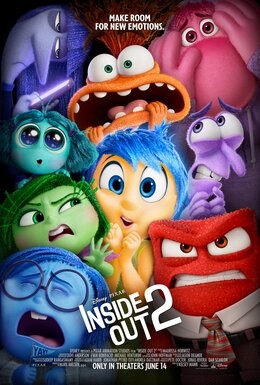
Many of us, myself included, were never taught how to regulate our emotions.
That’s why I love the Inside Out Movies. Pixar‘s creators take complex subjects like emotions, brain development, and mental health, making them easy to grasp and understand in Inside Out One and Two.
While there is still so much for us to learn about the human brain, I think it’s safe to say that no matter what, your emotions will not go away anytime soon—even if you are a Christian.
However, as Christians, we can be afraid and very intentional about not allowing our emotions to control our lives and our actions. Here is an Inside Out Two movie review from a Christian perspective.
Christians Need To Overcome Their Fear Of Feeling Their Feelings
It is easy to assume that if people are not showing their emotions, they are not feeling them. On the other hand, assumptions can be made about overt expressions of feelings, and people may think they aren’t real or that the other person is being “overly sensitive.”
Some Christians might even judge spiritual moments marked by an overwhelming show of emotion as not from God and could be considered emotionalism.
However, we quickly forget that God designed us in His image, which includes emotions and the ability to feel our feelings. In the article “Since When Is It Wrong For Christians To Have Feelings,” Richard Blackaby writes:
“For those who claim to meet with this God and yet remain entirely unmoved, I question whether they truly understand who they have just encountered. Some people seek to know Christ with their head, but not their heart.”
The Beginning Of The End?
The first Inside Out movie showed us the inner workings of Riley’s mind. Since Joy is the top emotion, you learn quickly how the pressure to be happy all the time can cause depression. This was portrayed through Joy keeping sadness away from Riley’s core memories.
Trying to avoid the sadness she felt is what took Riley to the level of depression and making some bad choices based on her emotions. As was shown in the first movie, we can’t stop our feelings, and like Joy learned, “All emotions have their place in one’s life.”
However, Inside Out Two comes with a whole new set of emotions and a complete control panel upgrade after Riley goes through puberty. We are introduced to Anxiety, Embarrassment, Envy, and Ennui. These emotions are designed to help Riley endure the difficult High School years and young adulthood.
Anxiety quickly points out, “Riley needs more complex emotions in her life now.” Through the efforts of Anxiety taking control of Riley, the original emotions—Joy, Sadness, Anger, Disgust, and Fear—find themselves on an adventure to find a way to be freed from being suppressed emotions and help Riley become herself again.
But How Does One Become Oneself Again?
Inside Out Two also introduces the viewer to a new concept, one that is far greater and deeper than core memories—Riley’s belief. The introduction of belief shows us the beginning development of Riley’s making choices outside of her emotions.
Instead, her feelings and reactions toward certain situations in her life cause her to establish these beliefs about herself and how the world works. Her new belief system starts to guide her choices. Joy is confident and trusts in Riley’s new belief system.
Of course, Joy is still in the driver’s seat and will use the tools she creates to ensure Riley’s new beliefs are rooted in Joy’s chosen memories for Riley.
Joy carefully picks out memories like regrets or bad choices and sends them to the “back of the mind,” so Riley’s belief system is not built on anything bad. Joy is trying to control the situation and is unaware that you can’t just wipe away the bad and create a life that is only good, happy, and free from bad thoughts, feelings, or belief systems.
Inside Out Two Is A Movie Full Of Truths Christians Need To Hear
One of the best truths outlined in Inside Out Two is that our emotions do not define who we are. Our emotions are cogs in the wheel that build our sense of self and beliefs. According to the writers of Inside Out Two, your emotions surround experiences, and those experiences become what makes up “belief.”
This is important for Christians to hear because the foundation of their faith is built on their belief.
What you believe about God, Jesus, and the Holy Spirit matters. Your faith will define your relationship with God and your relationships with the people around you. How you connect with God is rooted in what you believe to be true about God, His love for you, and the relationship He wants to have with you.
Riley’s beliefs about herself change in the movie based on her emotions, which drive her actions at the moment. If you do not have control over your feelings, your beliefs in God can also be affected by what you are feeling.
In the article “What Does The Bible Say About Managing/Controlling Emotions?” the author states:
“Sometimes our emotions are grounded in truth, and sometimes they are “false” in that they are based upon false premises. For example, if we falsely believe that God is not in control of the circumstances of our lives, we may experience the emotions of fear or despair or anger based on that false belief. Regardless, emotions are powerful and real to the one feeling them. And emotions can be helpful indicators of what is going on in our hearts.”
Are Emotions Deceptive?
Many Christians will agree that emotions can be deceptive.
Inside Out Two portrays this so well when Anxiety uses Riley’s imagination to create all the “worst-case scenarios” Riley could face during a situation she is up against. This leads to a scene where Riley’s emotions are out of control, including those driving her thoughts, actions, and beliefs.
The fact is, you are always feeling something at any given moment, whether you realize it or not. Emotions come in many different forms. Just because you aren’t crying does not mean you are stronger than the next person. On the other hand, just because you are sad does not mean you are weaker than the person who shows less emotion.
You might be wondering:
- So, if emotions are deceptive, doesn’t that make them the enemy?
- Isn’t it better to just avoid them instead of feeling them?
Controlling your emotions might sound like the solution. But as the saying goes, that’s “easier said than done.” Controlling your emotions may seem impossible. If you have tried to control your emotions but failed, you may have defaulted to repressing your feelings.
Learning How To Control Your Emotions
I can’t tell you how often I have listened to a sermon stating not to let our emotions control us. However, I think this message also comes with an underlying belief that the only way to avoid letting your emotions control you is not to feel your feelings, especially the bad ones.
Maybe that’s not what is overtly said in any one message, but given the tone and delivery of the sermon, my guess is the core focus is always self-control. True, self-control is a fruit of the spirit, which we all want. Even Paul said, “I do what I don’t want to do.”
In the article “Emotions Make Terrible Gods, Taking Control Of Our Feelings,” Greg Morse writes:
“God gives us the wonderful gift of emotions to color life. He is a feeling God, and those made in his image are not robots. But while feelings are wonderful servants, they are terrible gods. When they flow — ungoverned by God’s Spirit and God’s Reality — they make us threats both to others and to ourselves.”
In the movie Inside Out Two, Riley has a hard time controlling her anxiety, which is instead controlling her and her beliefs. The plot of this movie guides the viewer to realize this very big concept: learning how to have self-control over your emotions and not allow them to get out of control.
According to the article “What Emotions Are Christians Allowed to Feel?”, Becky Beresford writes:
“Our emotions offer a doorway into the happenings of our heart. When we allow ourselves to process through our feelings, with the lens of God’s truth as our guide, holy growth is guaranteed.”
If you want self-control over your feelings, you must understand that the key is to feel your emotions. By doing this, you will grow mentally strong and strengthen your walk with God. You need to process your feelings.
How to Feel Your Feelings Without Suppressing Them Or Letting Them Control Your Life
According to Healthline, you can become the boss of your emotions by doing the following:
- Look at the impact of your emotions.
- Aim for regulation, not repression.
- Identify what you are feeling.
- Accept all of your emotions.
- Journal your thoughts and feelings.
- Pause and take a deep breath.
- Know when to express yourself.
- Give yourself some space.
I would also add prayer to this list—often, my prayers are filled with me sharing my thoughts and feelings with God, and they sound like this:
- God, I am afraid….
- God, I am angry about…
- God, I am sad about…
- God, thank you for…
- God, help me have (the motivation, strength, and energy) to…
Conclusion
Inside Out Two made me laugh out loud many times, and I was not the only one laughing in that sold-out theater. But this movie also made me cry. I almost did the ugly cry, but I controlled myself and only shed a few tears. Seeing a film about the real emotions we all feel and the concrete factor of beliefs we can all relate to made me feel like I could understand my faith more.
The most deceptive belief we can have as Christians is that we can get rid of our emotions. The truth is they never go away.
However, like the emotions learned in Inside Out Two, feelings don’t determine who Riley is. Riley determines her beliefs, rooted in experiences, but there is always room for growth and a change in perspective. The part that turned her life into a lie was when she tried to change her feelings and when her emotions wanted to control her instead of the other way around.
Inside Out Two teaches Christians much about emotions, beliefs, and identity. This movie shines a light on overcoming the fear of feeling your feelings. Life happens, and it’s not always good. But God is good, and when we walk with Him, we have his healing embrace wrapped around our fragile and often chaotic lives and beliefs.

















